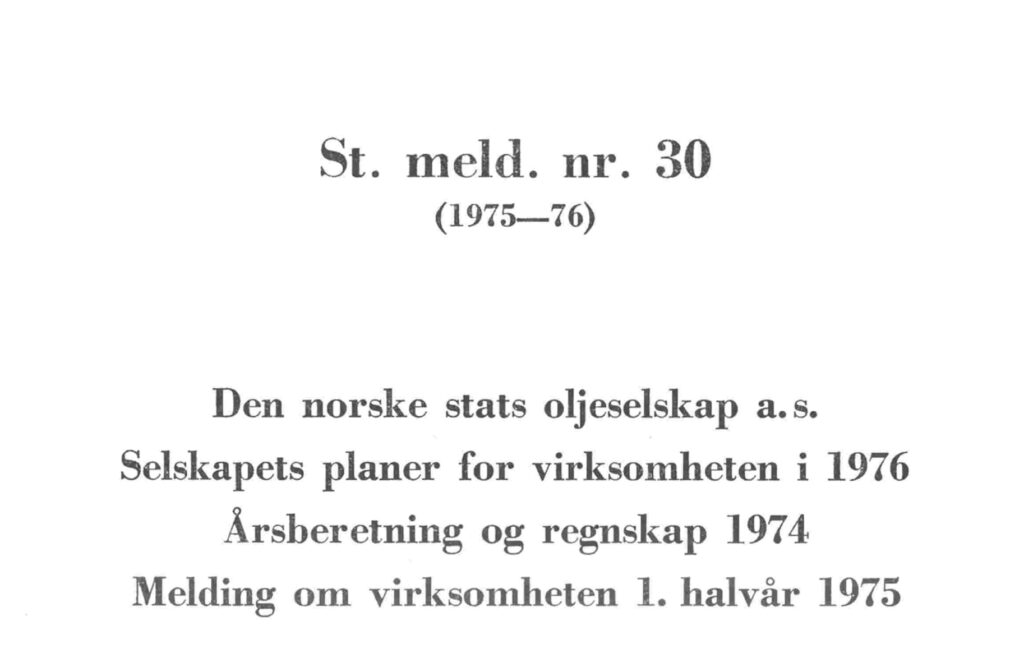Clarifying Statoil’s governance

This debate flared up in the spring of 1973, when Statoil laid claim to a significant role in establishing the Norpipe pipelines for landing oil and gas from the Ekofisk field. Despite its minimal organisation, the newly created state oil company had shown itself to be a powerful player in relation to an international competitor. The question was how much power it would be allowed to exercise.
The minority non-socialist coalition headed by Christian Democrat Lars Korvald warned in the Storting on 27 April 1973 against the damage being done to Norway’s economy and its traditional industry by the feverish oil boom then under way. On the same occasion, Liberal Party industry minister Ola Skjåk Bræk announced a new White Paper and Storting debate on oil policy.[REMOVE]Fotnote: “Alt klart for rørledninger”, Aftenposten, 27 April 1973.
Clearer rules sought
At Statoil’s annual general meeting on 30 May 1973, Skjåk Bræk called for “rules” governing the company. He meant that it only had a provisional object clause, and noted that the board was responsible for formulating detailed articles of association to be submitted to the Storting for approval.
Almost a year had now passed since the company was established and, in the minister’s view, the time had come to tighten control. This work was a matter urgency, because he wanted to include the proposed articles in the planned White Paper.
Statoil chair Jens Christian Hauge paid little attention to the minister’s request. He quite simply failed to see the need for such rules, and work on the articles therefore received low priority. After all, the company faced many other time-consuming issues. These included utilisation of blocks on the Norwegian side of the North Sea boundary near Britain’s Brent field, participation in the Frigg gas discovery operated by Elf, and involvement in petrochemical production based on feedstock from Ekofisk.
The path was being staked out, and Statoil wanted the freedom to be able to position itself appropriately. Nothing was accordingly done during the summer of 1973 on developing articles for the company. Hauge, who had deep roots in Labour, perhaps had at the back of his mind a conviction that the party would win the general election that autumn to provide a more Statoil-friendly industry minister.
When nothing had been done by the autumn, Skjåk Bræk met the Statoil board at his request on 3 October. The election had made it clear by then that Labour’s Trygve Bratteli would take over again as prime minister. This therefore became a farewell encounter between directors and minister, who did not want to depart without having had his say.
Frustrated industry minister
It proved a long session. Skjåk Bræk was clearly frustrated and had several complaints to voice about the company’s behaviour. Rumour had it that Statoil wanted to raise large loans in foreign banks, become an operator, engage in petrochemicals and even establish its own tanker fleet. All in all, much uncertainty prevailed about how powerful the company was thinking of becoming.
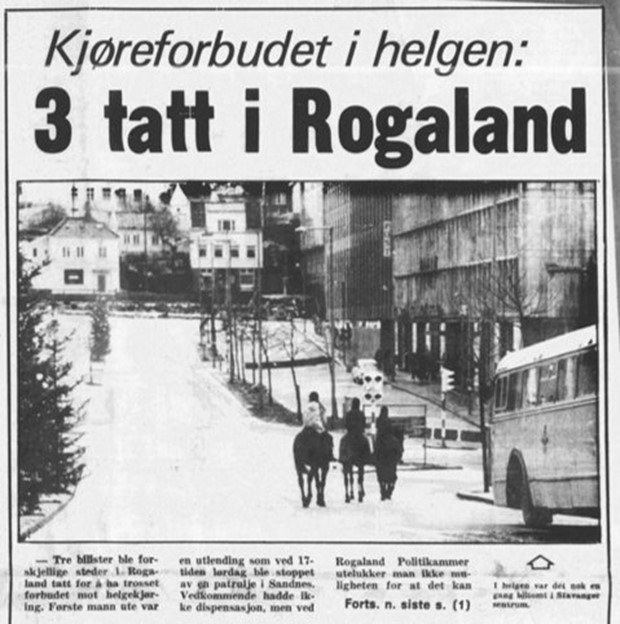
The final item on the agenda was Statoil’s articles of association. This subject had been discussed by the board for the first time only the day before. Hauge nevertheless claimed at the meeting with Skjåk Bræk that the company had been working on the issues involved in order to submit the study requested by the ministry.[REMOVE]Fotnote: Minutes, board meeting, Statoil, meeting with the Ministry of Industry, 3 October 1973. https://media.digitalarkivet.no/view/22486/38
Regardless of the lack of preparatory work, Hauge expressed his own views. He maintained that the challenge of reconciling the company’s commercial operations with political and parliamentary control applied not only to Statoil but also to all state companies.
Where the issue of a formula for allocating Statoil’s revenues was concerned, Hauge believed this to be irrelevant at that time. It would take many years for the company to begin making money. The challenge was to build an understanding that government appropriations and loans were needed to meet the big expenditures it faced over the next few years.[REMOVE]Fotnote: Ibid.
Skjåk Bræk was not convinced by Hauge’s arguments. In his view, a report on the articles was required, and the question of revenue allocation had been raised and needed a response. He said there was a widespread belief that substantial sums of money could fall outside direct government control and be used by Statoil for investment at home and abroad without the state having authority over them.
New government – same tune
After Labour returned to power in October and Ingvald Ulveseth took over as industry minister, Hauge undoubtedly expected the ministry’s view of Statoil’s role to be closer to his own than when it was controlled by the non-socialists. Labour had in the past supported a free and independent position for the company in relation to the government. Even with Ulveseth in charge, however, the question of the articles rolled on and relations between minister and Statoil again became fraught.
Unknown to Hauge and Johnsen, Skjåk Bræk had appointed a ministry group before his departure to prepare draft articles for the company. When Ulveseth took over, he asked this team to continue and complete its work by 20 January 1974.[REMOVE]Fotnote: Hanisch, Tore Jørgen and Nerheim, Gunnar, Norsk Oljehistorie. Fra vantro til overmot, vol 1, 1992: 308.
The proposals were ready by the deadline, and noted that Statoil was not a limited company run on purely commercial lines. It was also the most important instrument for implementing the government’s oil-related goals in its resource, environmental, supply, regional development and economic policies.
Another difference was that Statoil’s “capital base” was unlike that of other companies, since huge assets had been transferred to it in the form of rights to participate in exploiting petroleum deposits. These assets belonged to the Norwegian state and, given their size and significance, could not be left to the company’s board alone to administer.[REMOVE]Fotnote: Ibid.: 309.
The ministry group nevertheless emphasised that governance of Statoil had to be exercised within the framework of the Companies Act. Statoil’s general meeting – in other words, the industry minister – was its highest authority. But holding only one general meeting a year was felt to provide minimal opportunities to exercise control.
To improve the general meeting’s influence, the group proposed that it receive quarterly reports. An extraordinary general meeting in November would be presented with the budget for the next operating year. And a number of matters should always be submitted to the general meeting before the board decided on them. These covered proposals on:1. Significant changes to the approved budget
2. Participating in or acquiring/selling interests in companies
3. Entering into important collaboration agreements
4. Participating in oil operations outside Norway
5. Taking over as an operator or establishing operator companies
6. Important decisions by other companies where Statoil was a participant
7. Any other decision of far-reaching significance for the company’s activities.
Ulveseth undoubtedly had misgivings when he read this report. Was it too stringent? Rather than submit it to the Statoil board for consideration, he sent it privately to Hauge – who immediately showed it to Johnsen.
Furious chair
Hauge’s response on 24 January 1974 pulled no punches. He was furious, and described the group’s proposals as complete nonsense. As noted above, neither he nor Johnsen had been at all aware that a team had been appointed to work on these issues. It felt like a stab in the back for the company they were trying to construct.
These were strong words, but the proposals put on the table were also drastic. The ministry, not the board, was to:
- appoint and dismiss the CEO
- set and amend budgets
- have the last word over the choice of partners and the wording of commercial agreements.[REMOVE]Fotnote: Njølstad, Olav, Jens Chr. Hauge – fullt og helt, 2008: 638.
Hauge did not think the ministry had the expertise for this, or that these were ministerial duties at all. He wrote:
“In my view, the quintessential point is that the ministry will alter the Storting’s decision on establishing an independent state company to take care of the state’s interests, and convert Statoil into a camouflaged ministry office or a directorate with limited powers which acts on the ministry’s behalf.”[REMOVE]Fotnote: Hanisch and Nerheim, op.cit: 311.
Initial articles for Statoil, adopted by the general meeting in September 1972, had been drawn up with the intention of giving the company a broad remit in order to be able to compete on equal terms with the other oil companies. The object clause read:
The corporate object of Den norske stats oljeselskap a.s is, either by itself or through participation in or together with other companies, to carry out exploration for and production, transport, processing and marketing of petroleum and petroleum-derived products, as well as other business which bears a natural relation to this.
Hauge and Johnsen considered it crucial to retain this clause unchanged. Any contraction would make Statoil a second-rank oil company.[REMOVE]Fotnote: Johnsen, Arve, Utfordringen: Statoil-år, 1988: 106. To make that even clearer to Ulveseth, Hauge concluded his letter with the following salvo:
I have wanted to convey these reflections immediately so that no doubt should prevail about my view of the issue. The proposal from the group is completely unsuitable as the basis for a serious discussion on Statoil’s articles and on constitutional control.[REMOVE]Fotnote: Hanisch and Nerheim, op.cit: 312.
The arrogant tone in this letter was not very suited to further dialogue. After discussion in the board on 25 February, it was agreed that Hauge should draw up a draft of his own for the next meeting. This proved a compromise. Unlike the bureaucrats, for example, he proposed that the CEO should be appointed by the board and not the ministry. The suggestion of a general meeting in the autumn to present the budget was dropped.
Hauge’s revised articles were approved unanimously at the board meeting on 6 February. Directors Vidkunn Hveding and Per Mauritz Hansen, both from the Conservatives, indicated their disagreement – in reality camouflaged dissent – by having certain additional comments recorded in the minutes. These called for communication between ministry and board to be strengthened through more frequent meetings.[REMOVE]Fotnote: Njølstad, Olav, op.cit: 639.
Budget or plans?
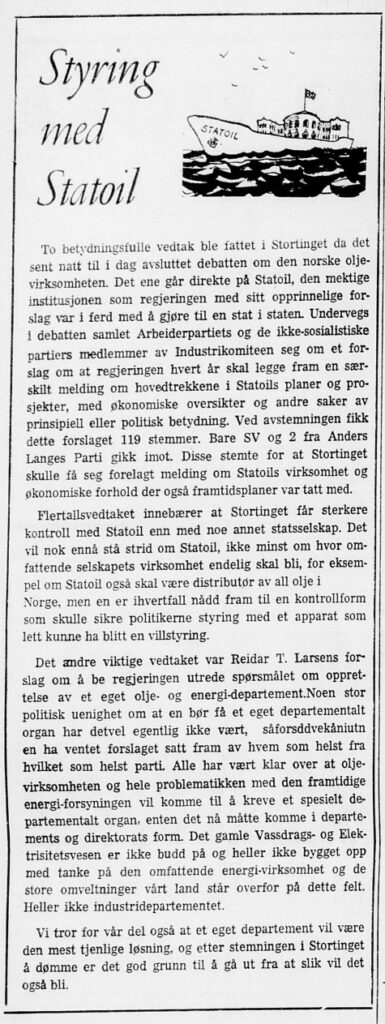
Ultimately, the Storting was responsible for approving the rules which governed the latitude accorded to Statoil. The ministry conducted yet another round and drew up a new draft after all the proposals made in White Paper no 30 of 15 March 1974 had been presented.
The grounds given for stronger parliamentary control of Statoil stressed the company’s sharp growth curve and that it was already in the process of developing subsidiaries (for involvement in pipelines). Should this continue on other fronts, a group structure would be approached which made clarifying relations with the ministry even more necessary.
It emerged from the White Paper that Hauge had won the day on some issues. Article 6, for example, proposed that the board should appoint the CEO – not the ministry.
The issue which sparked the biggest disagreement was whether the board should submit Statoil’s budget to the general meeting, as sought by the ministry. Article 10, as proposed in the White Paper modified this. In line with Hauge’s proposal, too, the word “budget” was replaced with “plans”.
According to the revised proposal, the board would be required to submit all matters involving aspects considered significant politically or in terms of principle to an annual or extraordinary general meeting. That included plans for the coming year with financial overviews, and for collaboration with other companies.[REMOVE]Fotnote: Proceedings of the Storting, bound edition, 1973-74, volume 118, no 3c: 638.
Storting adopts the articles
When the matter came up for debate in the Storting on 11 July 1974, the non-socialists parties – with the Conservatives in the lead – had prepared a new proposal. In practice, this would require Statoil to submit its budget to the Storting via the general meeting.
Oslo daily Aftenposten speculated that Ulveseth would now be defeated and a government crisis could follow. Although the non-socialists lacked a majority, the Labour Party was a little concerned that representatives from the Socialist Left (SV) would vote for the amendment. Its leader, Reidar Larsen, had expressed a view similar to the rest of the opposition.
Odvar Nordli, Labour’s parliamentary leader, accordingly contacted Korvald and hammered out a compromise – immediately dubbed “Norvald” by Statoil.[REMOVE]Fotnote: Njølstad, Olav, op.cit: 640. This replaced “budget” with the term “financial overviews”:
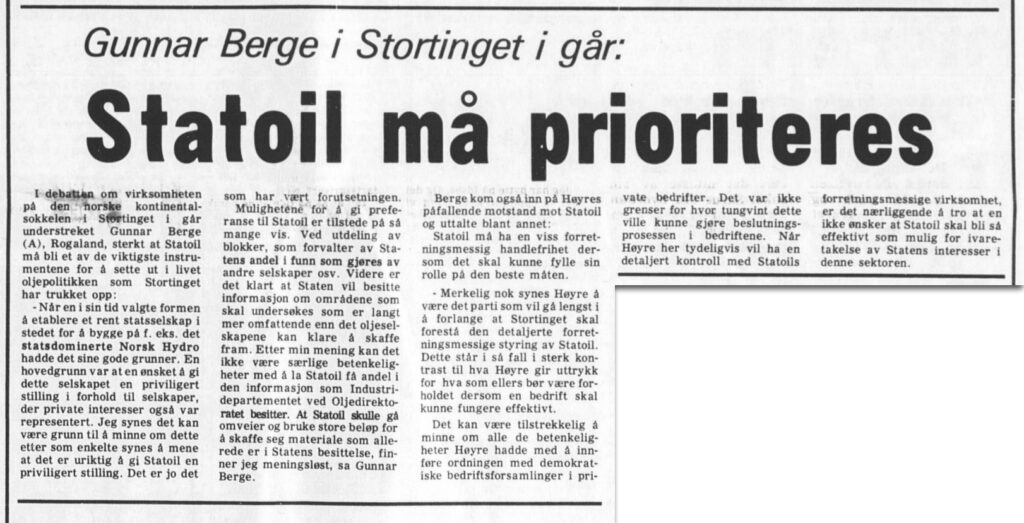
The Storting requests the government to submit a special annual report presenting the main features of Statoil’s plans and projects with financial overviews and other matters of particular significance politically and in terms of principle.[REMOVE]Fotnote: Ibid.
This solution was also supported by the Liberals, with Hallvard Eika from that party as the rapporteur on behalf of all the members of the standing committee on industry – with the exception of Larsen. A six-hour debate in the Storting followed before the issue was finally settled.
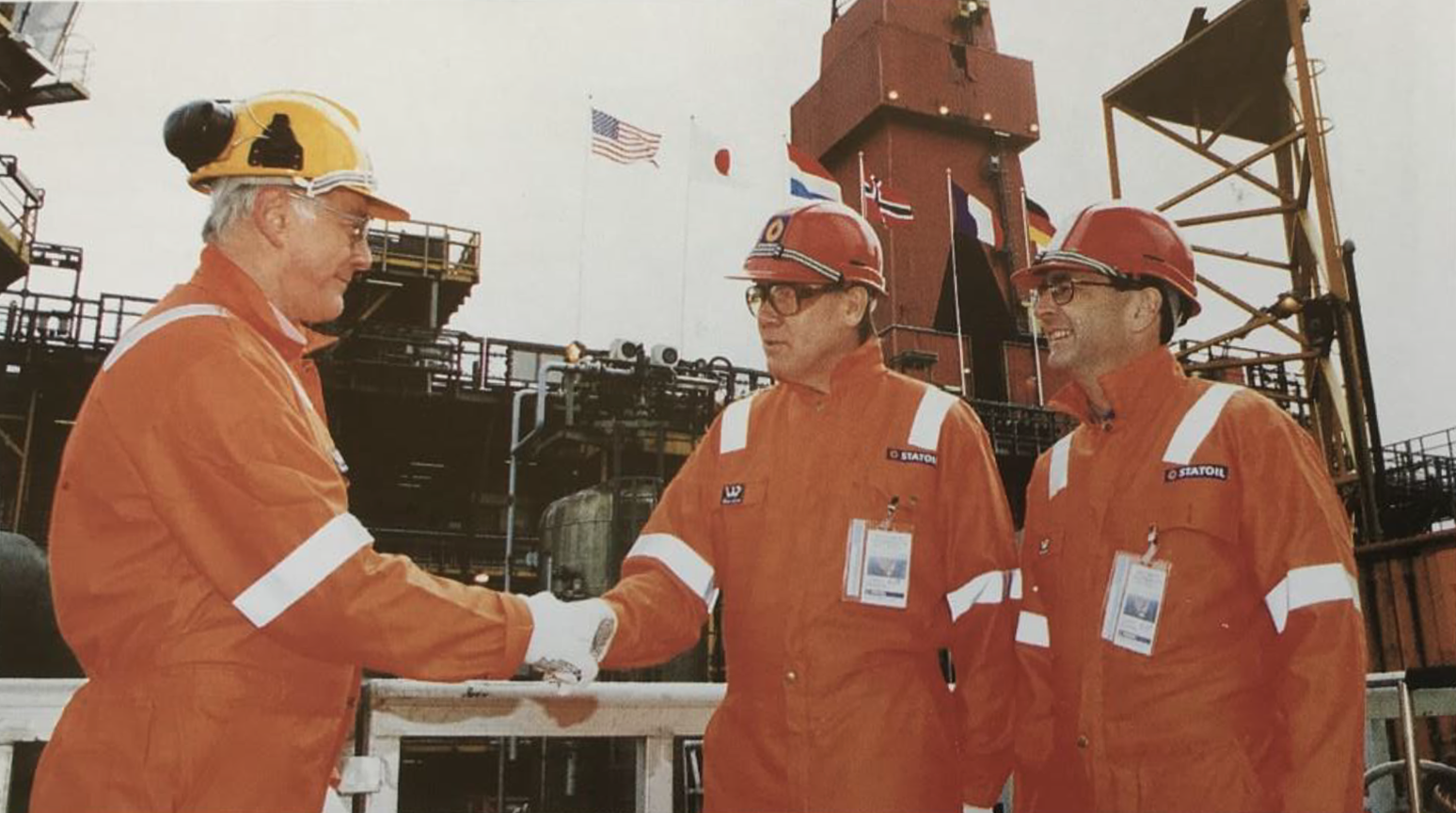
Labour’s Gunnar Berge argued strongly for making Statoil the most important instrument in realising the oil policies drawn up by the Storting. He found it odd that the Conservatives wanted to go furthest in demanding that the Storting should be responsible for detailed commercial management of the company. This contrasted sharply with the party’s normal position on how an enterprise could function efficiently. He suspected that the Conservatives did not want Statoil to become as effective as possible in protecting the state’s interests in this sector.[REMOVE]Fotnote: “Statoil må prioriteres”, Rogalands Avis, 12 June 1974.
As with earlier Storting debates on the company, the outcome was broad agreement. Just before midnight on 11 June, the motion that the government should present an annual report as outlined above – often called the article 10 plan – was passed by 119 votes to 18.
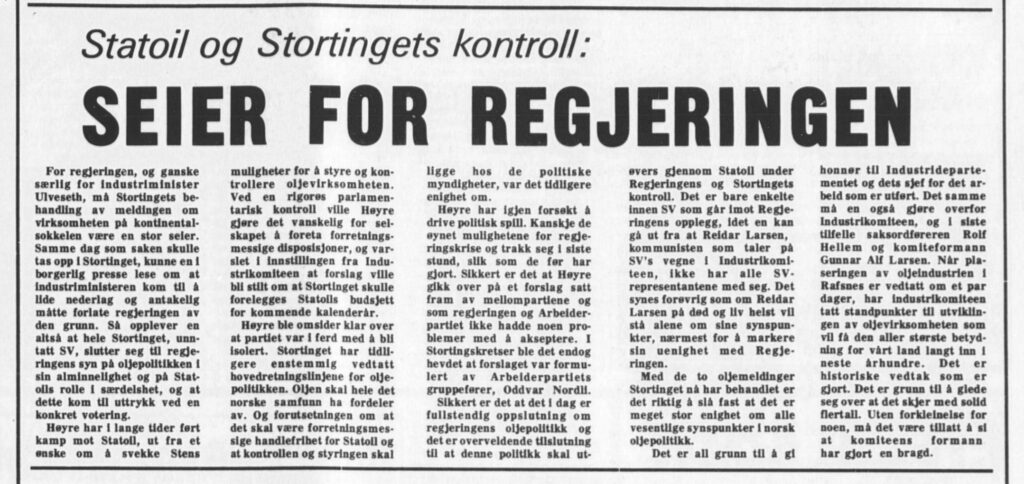
This result was regarded as a victory for a Labour government which was, after all, in a minority. Despite the Conservative desire for stronger government control of Statoil, a virtually unanimous Storting had decided that the existing main guidelines for the company would remain in place.[REMOVE]Fotnote: “Seier for regjeringen”, Rogalands Avis, 12 June 1974.
Johnsen was pleased that the word “budget” had been removed from the majority decision. That was the most important consideration.
Kåre Willoch from the Conservatives was partly satisfied. The decision meant at least that Statoil could not initiate significant projects without first telling the Storting about these so that the politicians could form a view on them.
The company’s dispositions were thereby subjected to some extent to parliamentary control. But the Conservatives were not wholly content. According to historian Tore Jørgen Hanisch, a feeling spread within the party that it had lost an important battle.[REMOVE]Fotnote: Hanisch and Nerheim, op.cit: 315-318.
It is worth noting that Larsen presented another proposal in the debate, which was approved. This asked the government to study the question of establishing a dedicated ministry for petroleum and energy. Everyone could see the scope and speed of developments in Norway’s oil sector. The separate ministry needed to handle these matters was established in 1978.
